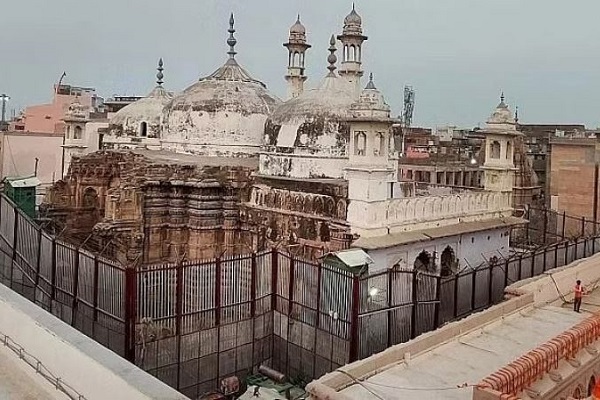Lawyer of Muslim Litigants Refutes Hindu Temple Evidence in Gyanvapi ASI Report

The lawyer representing the Muslim litigants in the Kashi Vishwanath-Gyanvapi mosque dispute, Ikhlaq Ahmed, on Friday dismissed the claims that the Archaeological Survey of India (ASI) report, which was submitted to the district court earlier, revealed the existence of a Hindu temple beneath the Gyanvapi mosque complex in Varanasi.
Ahmed, who received a certified copy of the ASI report as per the court's order on Wednesday, told reporters in Varanasi that the "broken idols" found in the mosque premises were not proof of a Hindu temple.
He said that there was a building in the mosque known as North Yard Gate, where five tenants who sculpted idols used to live. He said that the area was open before being barricaded and the debris of the idols was discarded there.
He also said that no idol of Lord Shiva was found in the premises, nor was there any evidence of a temple in the western wall of the mosque. He said that he would study the report and file objections wherever he felt the report was erroneous.
Read More:
Ahmed's statement came a day after Vishnu Shankar Jain, the lawyer of the Hindu litigants, claimed that the ASI report confirmed that the Gyanvapi mosque was built after demolishing a Hindu temple in the 17th century.
Jain said that the 800-page report mentioned the discovery of ancient scriptures in Kannada, Devanagari, and Telugu languages inside the mosque premises, which were related to Rudra, Janardan and Vishweshwar. He also claimed that the pillars of the destroyed temple were used to construct the mosque.
The Varanasi court had directed on Wednesday to provide the hard certified copies of the ASI report to the lawyers of both sides. Both the Hindu and the Muslim parties had sought copies of the ASI survey report, which was submitted in two sealed covers last month.
Read More:
The ASI survey, which began on August 4, used ground-penetrating radar and other scientific instruments to examine what lay beneath the surface of the Gyanvapi mosque premises. The team also surveyed the inner and outer walls, the cellar and other parts of the premises, except the 'wuzukhana'.
The ASI report drew sharp reactions from some political leaders. AIMIM chief Asaduddin Owaisi called the ASI the handmaiden of Hindutva and said that the report lacked academic rigour and was based on conjecture. BJP leader Giriraj Singh said that the Muslim side should hand over the mosque to the Hindus.
Not the final word
The Anjuman Intezamia Masajid Committee, which manages Gyanvapi mosque, said the document is not a court judgment or “the final word”.
The Gyanvapi panel said they are studying the ASI survey report.
Mohd Yasin, the secretary of the committee, said, "This is just a report and not a 'faisala' (judgment). There are several kinds of reports. It is not the final word on the issue."
He said the Muslim side would present their views when the Supreme Court hears the matter linked to the Places of Worship (Special Provisions) Act, 1991.
Read More:
The Gyanvapi mosque dispute has been a longstanding issue between the two communities, but it gained momentum after the Supreme Court's verdict in favour of the Ram Temple in Ayodhya. The Hindu litigants claimed that a part of the Kashi Vishwanath Temple was demolished by the Mughal emperor Aurangzeb in the 17th century and the Gyanvapi mosque was built over it. The Muslim litigants argued that the mosque existed before Aurangzeb's reign and that the land records also supported their claim.
Source: Agencies



